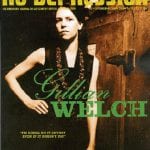Gillian Welch – Quicksilver Girl
Shortly after the lunch rush ends, Gillian Welch comes to breakfast, leaving David Rawlings home to sleep off the long drive from New York. She enters dripping wet — it is, briefly, monsoon season — and smiling. Nobody gives her a second glance, though the Pancake Pantry is one of the few places in Nashville where one might glimpse Garth Brooks or Buddy Miller, where heads turn like owls at the scent of fame, or, sometimes, talent.
Regardless, this is unmistakably her moment, that rare instant in one’s career when concealed doors open suddenly and one must hunt among the horns for a halo. Not that it shows. Central to the success of the O Brother soundtrack (on which she wrote, sang, and earned an associate producer’s credit) and with a key role in Down From The Mountain, the new film documenting the concert reprising the soundtrack, Gillian Welch is perfectly poised to cash in, if not sell out.
And perhaps she will, only it will most assuredly be on her terms.
Which are these: She will write songs and make records, and the songs that fit on her records will be released on the label she and Rawlings have just launched, Acony. And though one may easily find bizzers around Nashville who doubt the wisdom of those choices, her third and newest release, Time (The Revelator), is an extraordinary artistic achievement. And that is her answer.
Those words gurgle like the worn cliches they are, but the music brooks no argument against their use. The ten songs of Time (The Revelator) weave together in intricate, subtle, revealing patterns, words and ideas recirculating throughout, culminating in the 14:40 epic closer, “I Dream A Highway”. They have made one of the finest albums released in this or any other year.
Time (The Revelator) is explicitly a folk album, provided one understands folk music to be a continuum, not an archive. Provided one understands folk music to encompass everything from old-time fiddle tunes to rock to country to blues to bluegrass, and whatever else litters the landscape that might be of use. Welch and Rawlings have gathered together fragments from across the rich history of American music and reset them as small, subtle jewels adorning their own keenly observed, carefully constructed language. At the same time, they have moved past the Appalachian murder ballads (“Caleb Meyer”, etc.) of previous albums and into fresh territory that seems uniquely their own.
++++++++++++++++++++++++++++++++++++++++
This is an excerpt of the full article which appeared in The Best of No Depression: Writing About American Music, which features 25 of the finest articles from the magazines back issues, and was published in 2005 by University of Texas Press to help celebrate the magazines 10th anniversary. Due to our agreement with UT Press we are unable to include this article in our online archive.
The Best of No Depression is the only place you can find these articles other than our back issues. Visit the No Depression store to buy your copy for only $10.
The 300-page volume includes co-editor Grant Aldens award-winning 2001 feature on Billy Joe Shaver, co-editor Peter Blackstocks 1998 Artist of the Decade piece on Alejandro Escovedo, senior editor Bill Friskics-Warrens 2002 cover story on Johnny Cash, contributing editor Paul Cantins deep exploration of Yankee Hotel Foxtrot-era Wilco; and many other high points from our print heyday.
Table of contents for The Best of No Depression:
Preface, by Grant Alden and Peter Blackstock
Los Lobos, by Geoffrey Himes
Alejandro Escovedo, by Peter Blackstock
Jon Dee Graham, by Peter Blackstock
Billy Joe Shaver, by Grant Alden
Ray Wylie Hubbard, by John T. Davis
Flatlanders, by Don McLeese
Ray Price, by David Cantwell
Johnny Gimble, by Bill C. Malone
Johnny Cash, by Bill Friskics-Warren
Rosanne Cash, by Lloyd Sachs
Lucinda Williams, by Silas House
Buddy & Julie Miller, by Bill Friskics-Warren
Kasey Chambers, by Geoffrey Himes
Loretta Lynn, by Barry Mazor
Patty Loveless, by Bill Friskics-Warren
Kieran Kane, by Peter Cooper
Paul Burch, by Jim Ridley
Hazel Dickens, by Bill Friskics-Warren
Gillian Welch, by Grant Alden
Ryan Adams, by David Menconi
Jay Farrar, by Peter Blackstock
Jayhawks, by Erik Flannigan
Wilco, by Paul Cantin
Drive-By Truckers, by Grant Alden
Iron & Wine, by William Bowers




